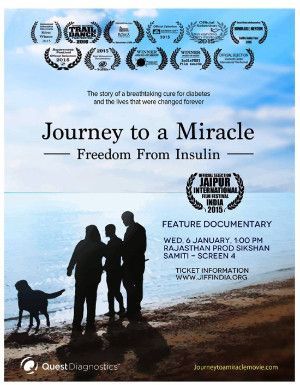
A new documentary that aired on Tuesday evening asserts that T1D is often incorrectly diagnosed. The film, Journey to a Miracle: Freedom from Insulin, suggests that many children who are told they have T1D actually have a different disease called monogenic diabetes, which can be treated with oral pharmaceuticals. The film is generating some attention and we have been asked by the community to clarify what is fact, what is fiction, and what is not yet known.
Monogenic diabetes is caused by an abnormality in a single gene whereas type 1 diabetes is polygenic (multiple genes). The symptoms are similiar in that blood sugars, when untreated, rise dramatically. However, a person with monogenic diabetes is less able to make insulin compared to person with T1D who is unable to make insulin. Insulin can effectively treat both diseases but is not necessary for a person with monogenic diabetes who can utilize pills to manage blood sugar. A genetic test is the sure-fire way to tell if you have monogenic diabetes.
PREVALENCE DATA
Monogenic diabetes is a very rare disease. Here are a few statistics showing the number of people with monogenic diabetes as a percenatage of the total number of all people with diabetes of any type at any age:
- The United States National Institute of Health (NIH): 1-5%
- University of Chicago Medicine Kovler Diabetes Center: 2%
- University of Washington: 1-2%
- University of Bergen, Norway: 1.1%
EVIDENCE OF MISDIAGNOSIS
We find no evidence to date that indicates T1D is grossly misdiagnosed. There is very little data and few academic studies that provide direct tracking information. There does appear to be anecdotal evidence that demonstrates cases of misdiagnosis but we have not found data to indicate how often this occurs.
Based on the data that is well understood, monogenic diabetes is rare and the vast majority of people living with T1D do indeed have T1D. However, there is no harm in having blood drawn for the gene test done on your next doctor visit.
LINKS:
NIH/NIDDK monogenic diabetes information page:
https://www.niddk.nih.gov/health-information/diabetes/types/monogenic-neonatal-mellitus-mody
University of Bergen monogenic diabetes prevalence study results:
The National Center for Monogenic Diabetes at the University of Chicago Website
University of Chicago monogenic diabetes registry:
https://www.ncbi.nlm.nih.gov/pubmed/23624530
Documentary:
